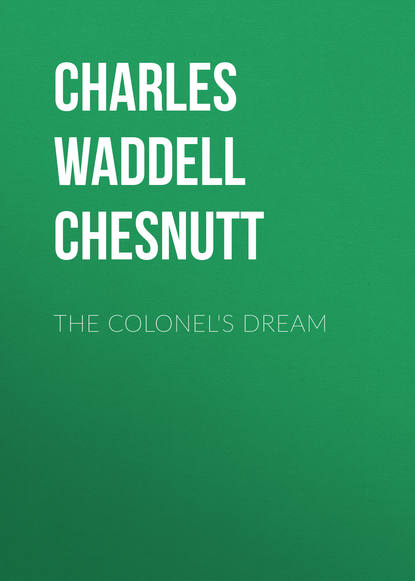По всем вопросам обращайтесь на: info@litportal.ru
(©) 2003-2024.
✖
The Colonel's Dream
Настройки чтения
Размер шрифта
Высота строк
Поля
"Did he? Well, now, that's too bad! I do generally git around about nine, but I was earlier this mornin' and as everybody was here, we started in a little sooner than usual. You wanted to see me about Bud Johnson?"
"Yes, I wish to pay his fine and give him work."
"Well, that's too bad; but you weren't here, and Mr. Turner was, and he bought his time again for Mr. Fetters. I'm sorry, you know, but first come, first served."
The colonel was seriously annoyed. He did not like to believe there was a conspiracy to frustrate his good intention; but that result had been accomplished, whether by accident or design. He had failed in the first thing he had undertaken for the woman he loved and was to marry. He would see Fetters's man, however, and come to some arrangement with him. With Fetters the hiring of the Negro was purely a commercial transaction, conditioned upon a probable profit, for the immediate payment of which, and a liberal bonus, he would doubtless relinquish his claim upon Johnson's services.
Learning that Turner, who had acted as Fetters's agent in the matter, had gone over to Clay Johnson's saloon, he went to seek him there. He found him, and asked for a proposition. Turner heard him out.
"Well, Colonel French," he replied with slightly veiled insolence, "I bought this nigger's time for Mr. Fetters, an' unless I'm might'ly mistaken in Mr. Fetters, no amount of money can get the nigger until he's served his time out. He's defied our rules and defied the law, and defied me, and assaulted one of the guards; and he ought to be made an example of. We want to keep 'im; he's a bad nigger, an' we've got to handle a lot of 'em, an' we need 'im for an example—he keeps us in trainin'."
"Have you any power in the matter?" demanded the colonel, restraining his contempt.
"Me? No, not me! I couldn't let the nigger go for his weight in gol'—an' wouldn' if I could. I bought 'im in for Mr. Fetters, an' he's the only man that's got any say about 'im."
"Very well," said the colonel as he turned away, "I'll see Fetters."
"I don't know whether you will or not," said Turner to himself, as he shot a vindictive glance at the colonel's retreating figure. "Fetters has got this county where he wants it, an' I'll bet dollars to bird shot he ain't goin' to let no coon-flavoured No'the'n interloper come down here an' mix up with his arrangements, even if he did hail from this town way back yonder. This here nigger problem is a South'en problem, and outsiders might's well keep their han's off. Me and Haines an' Fetters is the kind o' men to settle it."
The colonel was obliged to confess to Miss Laura his temporary setback, which he went around to the house and did immediately.
"It's the first thing I've undertaken yet for your sake, Laura, and I've got to report failure, so far."
"It's only the first step," she said, consolingly.
"That's all. I'll drive out to Fetters's place to-morrow, and arrange the matter. By starting before day, I can make it and transact my business, and get back by night, without hurting the horses."
Catharine was called in and the situation explained to her. Though clearly disappointed at the delay, and not yet free of apprehension that Bud might do something rash, she seemed serenely confident of the colonel's ultimate success. In her simple creed, God might sometimes seem to neglect his black children, but no harm could come to a Negro who had a rich white gentleman for friend and protector.
Twenty-five
It was not yet sunrise when the colonel set out next day, after an early breakfast, upon his visit to Fetters. There was a crisp freshness in the air, the dew was thick upon the grass, the clear blue sky gave promise of a bright day and a pleasant journey.
The plantation conducted by Fetters lay about twenty miles to the south of Clarendon, and remote from any railroad, a convenient location for such an establishment, for railroads, while they bring in supplies and take out produce, also bring in light and take out information, both of which are fatal to certain fungus growths, social as well as vegetable, which flourish best in the dark.
The road led by Mink Run, and the colonel looked over toward the house as they passed it. Old and weather-beaten it seemed, even in the distance, which lent it no enchantment in the bright morning light. When the colonel had travelled that road in his boyhood, great forests of primeval pine had stretched for miles on either hand, broken at intervals by thriving plantations. Now all was changed. The tall and stately growth of the long-leaf pine had well nigh disappeared; fifteen years before, the turpentine industry, moving southward from Virginia, along the upland counties of the Appalachian slope, had swept through Clarendon County, leaving behind it a trail of blasted trunks and abandoned stills. Ere these had yielded to decay, the sawmill had followed, and after the sawmill the tar kiln, so that the dark green forest was now only a waste of blackened stumps and undergrowth, topped by the vulgar short-leaved pine and an occasional oak or juniper. Here and there they passed an expanse of cultivated land, and there were many smaller clearings in which could be seen, plowing with gaunt mules or stunted steers, some heavy-footed Negro or listless "po' white man;" or women and children, black or white. In reply to a question, the coachman said that Mr. Fetters had worked all that country for turpentine years before, and had only taken up cotton raising after the turpentine had been exhausted from the sand hills.
He had left his mark, thought the colonel. Like the plague of locusts, he had settled and devoured and then moved on, leaving a barren waste behind him.
As the morning advanced, the settlements grew thinner, until suddenly, upon reaching the crest of a hill, a great stretch of cultivated lowland lay spread before them. In the centre of the plantation, near the road which ran through it, stood a square, new, freshly painted frame house, which would not have seemed out of place in some Ohio or Michigan city, but here struck a note alien to its surroundings. Off to one side, like the Negro quarters of another generation, were several rows of low, unpainted cabins, built of sawed lumber, the boards running up and down, and battened with strips where the edges met. The fields were green with cotton and with corn, and there were numerous gangs of men at work, with an apparent zeal quite in contrast with the leisurely movement of those they had passed on the way. It was a very pleasing scene.
"Dis yer, suh," said the coachman in an awed tone, "is Mistah Fetters's plantation. You ain' gwine off nowhere, and leave me alone whils' you are hyuh, is you, suh?"
"No," said the colonel, "I'll keep my eye on you. Nobody'll trouble you while you're with me."
Passing a clump of low trees, the colonel came upon a group at sight of which he paused involuntarily. A gang of Negroes were at work. Upon the ankles of some was riveted an iron band to which was soldered a chain, at the end of which in turn an iron ball was fastened. Accompanying them was a white man, in whose belt was stuck a revolver, and who carried in one hand a stout leather strap, about two inches in width with a handle by which to grasp it. The gang paused momentarily to look at the traveller, but at a meaning glance from the overseer fell again to their work of hoeing cotton. The white man stepped to the fence, and Colonel French addressed him.
"Good morning."
"Mornin', suh."
"Will you tell me where I can find Mr. Fetters?" inquired the colonel.
"No, suh, unless he's at the house. He may have went away this mornin', but I haven't heard of it. But you drive along the road to the house, an' somebody'll tell you."
The colonel seemed to have seen the overseer before, but could not remember where.
"Sam," he asked the coachman, "who is that white man?"
"Dat's Mistah Haines, suh—use' ter be de constable at Cla'endon, suh. I wouldn' lak to be in no gang under him, suh, sho' I wouldn', no, suh!"
After this ejaculation, which seemed sincere as well as fervent, Sam whipped up the horses and soon reached the house. A Negro boy came out to meet them.
"Is Mr. Fetters at home," inquired the colonel?
"I—I don' know, suh—I—I'll ax Mars' Turner. He's hyuh."
He disappeared round the house and in a few minutes returned with Turner, with whom the colonel exchanged curt nods.
"I wish to see Mr. Fetters," said the colonel.
"Well, you can't see him."
"Why not?"
"Because he ain't here. He left for the capital this mornin', to be gone a week. You'll be havin' a fine drive, down here and back."
The colonel ignored the taunt.
"When will Mr. Fetters return?" he inquired.
"I'm shore I don't know. He don't tell me his secrets. But I'll tell you, Colonel French, that if you're after that nigger, you're wastin' your time. He's in Haines's gang, and Haines loves him so well that Mr. Fetters has to keep Bud in order to keep Haines. There's no accountin' for these vi'lent affections, but they're human natur', and they have to be 'umoured."
"I'll talk to your master," rejoined the colonel, restraining his indignation and turning away.
Turner looked after him vindictively.
"He'll talk to my master, like as if I was a nigger! It'll be a long time before he talks to Fetters, if that's who he means—if I can prevent it. Not that it would make any difference, but I'll just keep him on the anxious seat."
It was nearing noon, but the colonel had received no invitation to stop, or eat, or feed his horses. He ordered Sam to turn and drive back the way they had come.
As they neared the group of labourers they had passed before, the colonel saw four Negroes, in response to an imperative gesture from the overseer, seize one of their number, a short, thickset fellow, overpower some small resistance which he seemed to make, throw him down with his face to the ground, and sit upon his extremities while the overseer applied the broad leathern thong vigorously to his bare back.
The colonel reached over and pulled the reins mechanically. His instinct was to interfere; had he been near enough to recognise in the Negro the object of his visit, Bud Johnson, and in the overseer the ex-constable, Haines, he might have yielded to the impulse. But on second thought he realised that he had neither authority nor strength to make good his interference. For aught he knew, the performance might be strictly according to law. So, fighting a feeling of nausea which he could hardly conquer, he ordered Sam to drive on.
The coachman complied with alacrity, as though glad to escape from a mighty dangerous place. He had known friendless coloured folks, who had strayed down in that neighbourhood to be lost for a long time; and he had heard of a spot, far back from the road, in a secluded part of the plantation, where the graves of convicts who had died while in Fetters's service were very numerous.
Twenty-six










